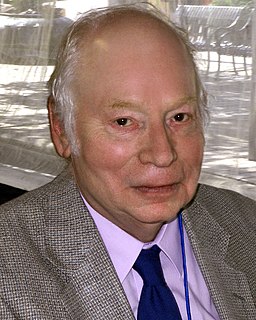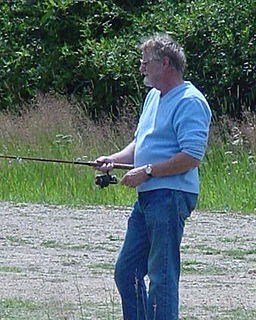Related Research Articles

Norman Hackerman was an American chemist, professor, and academic administrator who served as the 18th President of the University of Texas at Austin (1967–1970) and later as the 4th President of Rice University (1970–1985). He was an internationally known expert in metal corrosion.

Thomas Hunt Morgan was an American evolutionary biologist, geneticist, embryologist, and science author who won the Nobel Prize in Physiology or Medicine in 1933 for discoveries elucidating the role that the chromosome plays in heredity.

Steven Weinberg was an American theoretical physicist and Nobel laureate in physics for his contributions with Abdus Salam and Sheldon Glashow to the unification of the weak force and electromagnetic interaction between elementary particles.
Jeremiah Paul "Jerry" Ostriker is an American astrophysicist and a professor of astronomy at Columbia University and is the Charles A. Young Professor Emeritus at Princeton where he also continues as a Senior Research Scholar. Ostriker has also served as a university administrator as Provost of Princeton University.

Richard Eimer Lenski is an American evolutionary biologist, a Hannah Distinguished Professor of Microbial Ecology at Michigan State University. He is a member of the National Academy of Sciences and a MacArthur fellow. Lenski is best known for his still ongoing 34-year-old long-term E. coli evolution experiment, which has been instrumental in understanding the core processes of evolution, including mutation rates, clonal interference, antibiotic resistance, the evolution of novel traits, and speciation. He is also well known for his pioneering work in studying evolution digitally using self-replicating organisms called Avida.
Eric Rodger Pianka is an American herpetologist and evolutionary ecologist.
Miroslav Radman is a Croatian biologist.
Barbara J. Meyer is a biologist and genetist, noted for her pioneering research on lambda phage, a virus that infects bacteria; discovery of the master control gene involved in sex determination; and studies of gene regulation, particularly dosage compensation. Meyer’s work has revealed mechanisms of sex determination and dosage compensation—that balance X-chromosome gene expression between the sexes in Caenorhabditis elegans that continue to serve as the foundation of diverse areas of study on chromosome structure and function today.

Allen Joseph Bard is an American chemist. He is the Hackerman-Welch Regents Chair Professor and director of the Center for Electrochemistry at the University of Texas at Austin. Bard is considered a "father of modern electrochemistry" for his innovative work developing the scanning electrochemical microscope, his co-discovery of electrochemiluminescence, his key contributions to photoelectrochemistry of semiconductor electrodes, and co-authoring a seminal textbook.
Paul Frank Barbara was an American chemist. His research interests focused on the understanding of the molecular structure and dynamics of complex chemical systems, including organic semi-conductors for photovoltaic applications, proton and electron transfer reactions, the hydrated electron and intermediates in the reverse transcription mechanism of HIV-1. His laboratory developed and applied novel ultrafast and single molecule spectroscopies to study the complexity of these chemical system.
Russell F. Doolittle was an American biochemist who taught at the University of California, San Diego (UCSD). Described as a "world-renowned evolutionary biologist", Doolittle's research primarily focused on the structure and evolution of proteins. Highlights of Doolittle's decades of research include his role in co-developing the hydropathy index and determining the structure of fibrinogen.
Mary Jane West-Eberhard is an American theoretical biologist noted for arguing that phenotypic and developmental plasticity played a key role in shaping animal evolution and speciation. She is also an entomologist notable for her work on the behavior and evolution of social wasps.
Michael James Denham White FRS was a zoologist and cytologist.
Sharon Mosher is an American geologist. She did her undergraduate work at University of Illinois Urbana-Champaign. After earning an MSc from Brown University, she returned to the University of Illinois to get her PhD in Geology in 1978. Since 2001 she has held the William Stamps Farish Chair at University of Texas, and, since 2009 she has served as the dean of the Jackson School of Geosciences at Texas. In 2013 she became the president of the American Geosciences Institute.
Richard David Kolodner is an American scientist with Ludwig Cancer Research who has made research contributions to the genetic basis for inherited susceptibility to common cancers. He is a Distinguished Professor of Cellular and Molecular Medicine at the UC San Diego School of Medicine. Kolodner is a member of the National Academy of Sciences and National Academy of Medicine, and he is a fellow of the American Academy of Arts and Sciences.

David Crews is the Ashbel Smith Professor of Zoology and Psychology at the University of Texas at Austin. He has been a pioneer in several areas of reproductive biology, including evolution of sexual behavior and differentiation, neural and phenotypic plasticity, and the role of endocrine disruptors on brain and behavior.
Esmond Emerson Snell was an American biochemist who spent his career researching vitamins and nutritional requirements of bacteria and yeast. He is well known for his study of lactic acid-producing bacteria, developing microbiological assays for a number of key nutrients; the discovery of more than half of known vitamins has been attributed to the use of this work. He discovered several B vitamins, including folic acid, and characterized the biochemistry of vitamin B6.
Alok Krishna Gupta is an Indian mineralogist, petrologist and a former Raja Ramanna Fellow of the Department of Atomic Energy at the National Centre of Experimental Mineralogy and Petrology of the University of Allahabad. He is known for his studies on the genesis of alkaline rocks and is an elected fellow of all three major Indian science academies viz. the National Academy of Sciences, India, Indian National Science Academy and the Indian Academy of Sciences. The Council of Scientific and Industrial Research, the apex agency of the Government of India for scientific research, awarded him the Shanti Swarup Bhatnagar Prize for Science and Technology, one of the highest Indian science awards for his contributions to Earth, Atmosphere, Ocean and Planetary Sciences in 1986.

James Zachos is an American paleoclimatologist, oceanographer, and marine scientist. He is currently a professor and chair of the Department of Earth and Planetary sciences at University of California, Santa Cruz where he was elected to the National Academy of Sciences in 2017. He has conducted research on a wide variety of topics related to biological, chemical, and climatic evolution of late Cretaceous and Cenozoic oceans, and is credited with developing a new understanding of long-term climate change and climate transitions over the past 65 million years. His investigations of past climatic conditions help predict the consequences of anthropogenic carbon emissions on future climate change.
Mark A. Kirkpatrick is a theoretical population geneticist and evolutionary biologist. He currently holds the T. S. Painter Centennial Professorship in Genetics in the Department of Integrative Biology at the University of Texas at Austin. His research touches on a wide variety of topics, including the evolution of sex chromosomes, sexual selection, and speciation. Kirkpatrick is the co-author, along with Douglas J. Futuyma, of a popular undergraduate evolution textbook. He is a member of the United States National Academy of Sciences.
References
- ↑ Academy of Arts and Sciences elects three scholars from The University of Texas at Austin to class of 2003, University of Texas News, May 6, 2003. Accessed July 17, 2011
- ↑ National Academy of Sciences Members and Foreign Associates Elected, News from the National Academy of Sciences, National Academy of Sciences, May 3, 2016, archived from the original on May 6, 2016, retrieved 2016-05-14.